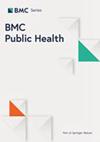The association between mental status, personality traits, and discrepancy in social isolation and perceived loneliness among community dwellers
IF 3.5
2区 医学
Q1 PUBLIC, ENVIRONMENTAL & OCCUPATIONAL HEALTH
引用次数: 0
Abstract
Social isolation and loneliness can co-occur; however, they are distinct concepts. There is discrepancy as some people feel lonely in social isolation, while others do not. This study sought to enhance our understanding of this discrepancy between social isolation and loneliness by investigating its related factors, with a specific focus on mental status and personality traits. This study adopted a cross-sectional study design and utilized data from the 2016 and 2018 waves of the University of Michigan Health and Retirement Study. The participants were community dwellers aged 50 years and older. The outcome measurement was defined as the discrepancy between social isolation, based on six criteria, and loneliness, assessed using the three-item version of the Revised UCLA Loneliness Scale. Multinomial logistic regression models were conducted to examine the factors associated with the discrepancy. Participants with fewer depressive symptoms and higher extraversion were associated with the only social isolation group and the only loneliness group rather than the group consisting of those who felt lonely with social isolation. In addition, lower neuroticism was associated with the only social isolation group. Participants with fewer depressive symptoms, lower neuroticism, and higher extraversion were more likely not to feel lonely even with social isolation, compared to feeling lonely even in the absence of isolation. Mental status and personality traits may be closely related to the discrepancy between social isolation and loneliness. This study suggests that incorporating social, mental, and psychological factors may be essential for interventions in social isolation and loneliness.社区居民的精神状态、个性特征与社会隔离和感知孤独的差异之间的关系
社会隔离和孤独可能同时存在,但它们是不同的概念。有些人在社会隔离中会感到孤独,而有些人则不会。本研究试图通过调查社会隔离和孤独感的相关因素,特别是心理状态和人格特质,来加深我们对社会隔离和孤独感之间差异的理解。本研究采用横断面研究设计,并利用了密歇根大学健康与退休研究 2016 年和 2018 年的数据。参与者为 50 岁及以上的社区居民。结果测量被定义为基于六项标准的社会隔离与孤独感之间的差异,孤独感使用修订版加州大学洛杉矶分校孤独感量表(UCLA Loneliness Scale)的三项目版本进行评估。我们采用多项式逻辑回归模型来研究与差异相关的因素。抑郁症状较少和外向性较高的参与者与仅有社会隔离组和仅有孤独感组相关,而与那些感到孤独和社会隔离的人组成的组无关。此外,神经质程度较低的人也与社会隔离组有关。抑郁症状较少、神经质程度较低、外向性较高的参与者即使在社交孤立的情况下也更有可能不感到孤独,相比之下,即使在没有社交孤立的情况下也会感到孤独。心理状态和人格特质可能与社会隔离和孤独感之间的差异密切相关。这项研究表明,结合社会、精神和心理因素可能是干预社会隔离和孤独感的关键。
本文章由计算机程序翻译,如有差异,请以英文原文为准。
求助全文
约1分钟内获得全文
求助全文
来源期刊

BMC Public Health
医学-公共卫生、环境卫生与职业卫生
CiteScore
6.50
自引率
4.40%
发文量
2108
审稿时长
1 months
期刊介绍:
BMC Public Health is an open access, peer-reviewed journal that considers articles on the epidemiology of disease and the understanding of all aspects of public health. The journal has a special focus on the social determinants of health, the environmental, behavioral, and occupational correlates of health and disease, and the impact of health policies, practices and interventions on the community.
 求助内容:
求助内容: 应助结果提醒方式:
应助结果提醒方式:


